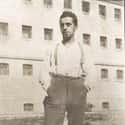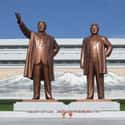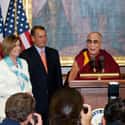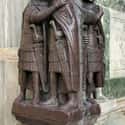-
(#6) The Bavarian Republic Was Run By Writers And Artists For Six Days
As World War I reached its disastrous conclusion for Germany, many revolutions and secessions took place within the country, including the revolution of a province called Bavaria. After a couple of abortive attempts, the various left-wing parties established a Soviet republic on April 6, 1919. At its head was Ernst Toller, an idealistic 26-year-old and future playwright. He was supported by many other artists and writers.
One of his advisors said they only needed a few days to reshape the world. Six days was all they would get. The various ministers under Toller's government ranged from incompetent to downright bizarre. His Commissar of Foreign Affairs sent a telegram to the pope complaining about a stolen bathroom key, which finally prompted Toller to remove him from office. The government accomplished nothing of substance in its time in power, and, on April 13, was deposed by a military coup.
The group of pacifist and anarchist thinkers who had run the government faced brutal consequences, including, in some cases, execution. Toller himself received a fairly light sentence of five years in prison, during which time he wrote some of his best plays, which are still in print today.
-
(#9) Lebanon
- Country
In 1943, Lebanon threw off its French colonizers and was faced with the challenge of devising a government in a land deeply divided by religious and ethnic tensions. The solution was a form of government known as "confessionalism." It has nothing to do with confessing sins, but instead refers to a system by which different ethnic and religious groups had representation in the government in proportion to their population size.
This solution was never meant to be permanent, but it remained in place even after the ousting of Syrian influence and troops in 2005. It is, without doubt, a flawed system, and the Lebanese are deeply divided on it. Some argue that it increases and encourages sectarianism, while others see it as the only way to prevent all-out war.
-
(#1) North Korea
- Country
After a visit to North Korea, the British academic Christopher Hitchens remarked: "North Korea is unique in having a dead man as head of state: Kim Jong-il is the head of the party and the army but the presidency is held in perpetuity by his deceased father, which makes the country a necrocracy or mausolocracy..."
The origins of the current North Korean state are incredibly complicated, but it is true that Kim Il-sung, the first leader of modern North Korea, is the "Eternal President" of the country. Kim Jong-un is the head of the party and the military, but technically not the state. The reason for this is that North Korea is one of the most intensely leader-worship-driven societies in the modern world. Kim Il-sung is literally revered as a god, with shrines in all major buildings, murals depicting his accomplishments, songs praising him, and regularly scheduled mandatory worship.
While this religious totalitarianism is unusual in the modern world, it is not without precedent. The deification of rulers is a tradition dating back to the Ancient Egyptian pharaohs.
-
(#10) The Dalai Lama Operates A Government-In-Exile
On August 21, 1959, the Dalai Lama crossed the border into India. He was forced out by Chinese suppression of a Tibetan uprising, and relocated to Dharamsala in India, with the support of the Indian government. From this position, he has been the leader of an exilarchy, a government-in-exile, that refuses to recognize Chinese control of Tibet.
While the Dalai Lama is a well-known public figure, raising support for his cause in the public arena, the actual functions of the Central Tibetan Administration have varied over the years. In 2011, the Dalai Lama gave up his political position and a democratic election was held, resulting in Dr. Lobsang Sangay becoming president of the CTA. The CTA splits its time between advocating for a free (or at least culturally autonomous) Tibet, fundraising, and supporting Tibetans in exile. One of its chief activities is administering schools for Tibetan exiles, of which there is a growing number each year.
There have been many exiled governments throughout human history, though Tibet is probably the most visible in the modern era. The Vatican has had so many splits and schisms, it even has a special name for someone claiming to be the legitimate pope but who does not rule from Rome: an Antipope.
-
(#8) The Roman Tetrarchy Had Four Rulers
At the end of the 3rd century CE, the Roman Empire was vast and in great upheaval. The Emperor Diocletian had elevated Maximian to co-Emperor (although Diocletian was still the chief). However, with a usurping Roman general claiming emperorship of Britain, Diocletian still had more on his plate than he could handle.
This was when Diocletian introduced the Tetrarchy, a strange and unprecedented governmental system. According to this system, Diocletian and Maximian would reign as the emperors, and two other Romans would reign as tetrarchs. The tetrarchs functioned as both vice-emperors and successors. This also made the emperors less vulnerable to capture or political assassination. The government remained stable through the government of Diocletian and Maximian and passed smoothly to their successors, Galerius and Constantius.
However, after the death of Constantius there came a period known as the Civil Wars of the Tetrarchy. This period ended when Emperor Constantine came to power in 324 and abolished the Tetrarchy.
-
(#2) High Wycombe
- Place
The town of High Wycombe, England, has a very old-fashioned way of checking for corruption. Traditionally, the mayor is weighed by a town official called the "Macebearer." The macebearer will call out the weight of the mayor, and if this call is followed by "and no more," it means the mayor has not been getting fat on the taxpayers' money. However, if the macebearer calls out "and some more," the crowd boos, and the mayor is accused of embezzlement.
While the tradition dates back to the Middle Ages, these days it's an entirely ceremonial moment. In the old days, the citizens would pelt corpulent mayors with rotten fruit. However, that part of the tradition hasn't survived.
New Random Displays Display All By Ranking
About This Tool
From the perspective of the development of world history, the country has transitioned from the rule of the king to the current democratically elected government, and the army has also become a part of the modern government. The governments of different countries in the world are now in power, and there are still some monarchy countries in the Middle East that are still controlled by the monarch, and some governments are in power by the military.
Looking back at history, the random tool lists 13 of the most bizarre governments that you may never know, such as North Korea, Andorra, Bosnia, and Herzegovina, etc. Many different forms of government tried to lead the country in reform and development.
Our data comes from Ranker, If you want to participate in the ranking of items displayed on this page, please click here.














